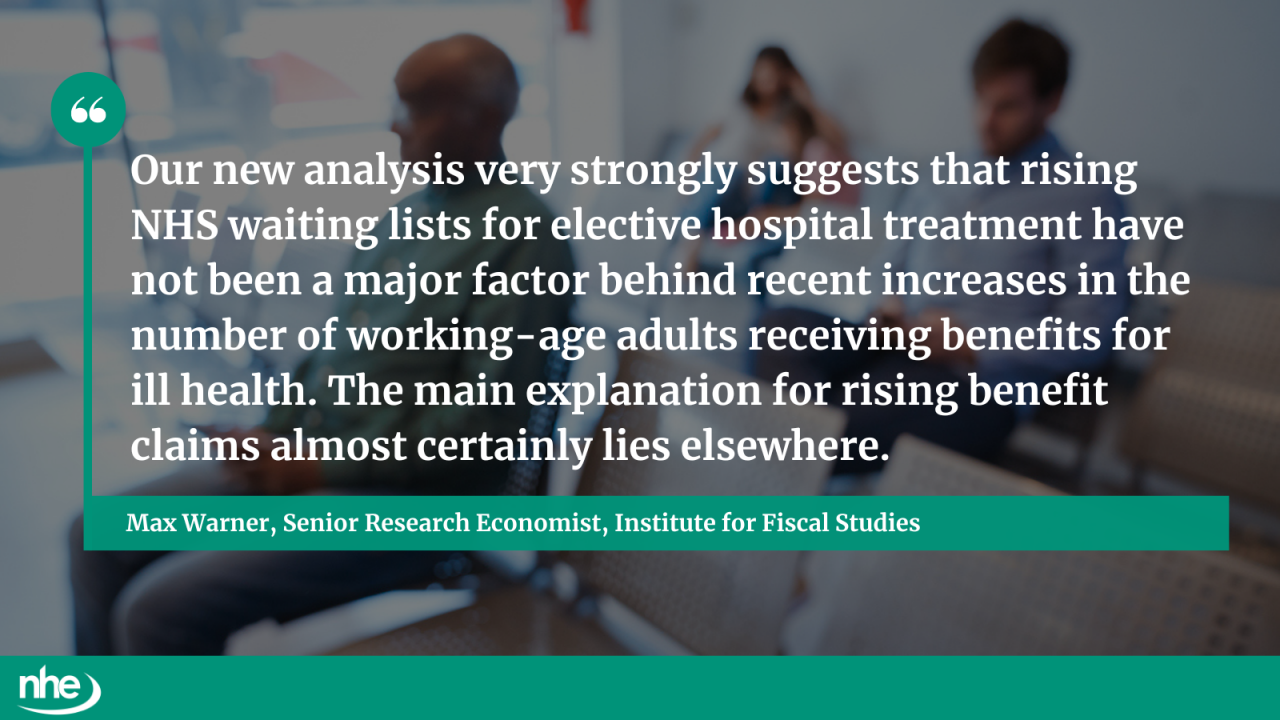The number of people claiming health-related benefits in England has risen substantially in recent years, coinciding with a pronounced increase in NHS waiting lists and waiting times.
However, new analysis by IFS researchers, published today, finds no evidence that rising waiting lists for pre-planned hospital treatment have been a major driver of increases in health-related benefit claims by working-age adults since the start of the pandemic.
Using newly constructed data at the very local level across England, the study found that local areas experiencing larger increases in NHS waits for elective hospital treatment between 2019 and 2024 did not, on average, experience significantly larger increases in disability or incapacity benefit claims. The same was true for areas with longer waiting times for NHS talking therapies.
There are some signs of a possible relationship between NHS waits and disability benefit claims for mental health and musculoskeletal conditions. These weak relationships suggest that longer NHS waits could perhaps explain around 7% of the national increase in benefit claims for these specific conditions, though this is likely an overestimate.
Senior Research Economist at IFS, and author of the report, Max Warner, said:
“Our new analysis very strongly suggests that rising NHS waiting lists for elective hospital treatment have not been a major factor behind recent increases in the number of working-age adults receiving benefits for ill health. The main explanation for rising benefit claims almost certainly lies elsewhere. Reducing hospital waiting times is a sensible policy objective, not least as it would benefit those who use the NHS – but we shouldn’t necessarily expect it to also deliver a significant reduction in health-related benefit claims. That’s a separate policy nut to crack.”

Data limitations prevent definitive conclusions about the causal impact of longer NHS waits on health-related benefit claims. However, the results strongly indicate that deteriorating NHS performance, as captured by rising waiting lists for elective hospital treatment or talking therapies, is responsible for at most a small fraction of the overall increase in health-related benefit claims among working-age individuals in recent years.
In response to the report, Dr Layla McCay, NHS Confederation’s Director of Policy commented:
“While there is no doubt many people on health-related benefits will be waiting for NHS treatment, the evidence from this new IFS analysis is that rising waiting lists for hospital treatments have not been fuelling the rise in working-age adults claiming benefits.
“It is clear that there are many factors that can impact people’s physical and mental health – including poverty, insecure housing and unemployment. We know poor mental health is the main driver of increases in economic inactivity in younger people and there are an estimated 1.6 million people waiting for mental health community care that will not be in hospital or Talking Therapy waiting list figures.
“Tackling long waiting lists for both physical and mental health treatment is not only good for patients but the economy as well. That is why our members fully support the government’s ambitions to shift from treatment to prevention and to move more care closer to people’s homes, with health system leaders already working with partners to build a comprehensive, whole-system approach to supporting people to work.
“The IFS’s analysis provides further evidence of the need for cross-government co-operation, collaboration and investment on health policy, recognising that most policy that impacts people’s health is made outside the NHS. This should be evidence-led and focused not just on the NHS, but across the social determinants of health to improve the health of our nation as part of the prevention agenda.”
Image credit: iStock



















